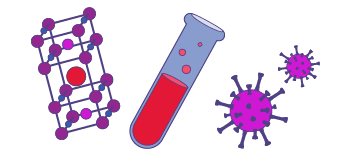Pulsed field gradient (PFG) NMR allows direct measurements of diffusivity and of the related diffusion propagator, i.e., the probability density for a molecule or ion to move a certain distance over a fixed time interval.
There are a number of pulse sequences available for PFG NMR measurements including sequences with bipolar gradients that can reduce disturbing influence of magnetic susceptibility differences in heterogeneous samples and of convection effects on the measured diffusivities.
The AMRIS facility in Gainesville, FL offers a possibility of performing PFG NMR measurements at the high field of 17.6 tesla using large gradients up to 30 T/m. This combination of high field and high gradients has proven to be extremely advantageous for performing many types of unique studies such as observations of single-file diffusion of Xe atoms in nanotubes and time-dependent diffusivity of carbon dioxide in functionalized room temperature ionic liquids.
Compatible probes, include the following gradient as well.

Explore our magnet schedule to see what exciting research is happening on our stellar fleet of instruments right now.
For more information, please contact Tom Mareci or Sergey Vasenkov.
Last modified on 23 August 2024